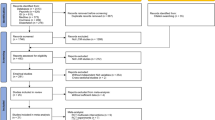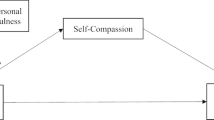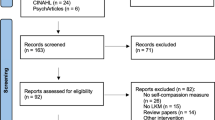Abstract
Formation and maintenance of compassionate and loving attitudes toward the self and others is essential for adaptive social functioning. In this study, we use lovingkindness meditation to enhance positive attitudes toward the self and others. Meditation-based programs often include several components for which specific effects and dynamics are largely unknown, precluding conclusive support for their effectiveness. The present study tested actions underlying two main components of lovingkindness meditation programs: discussion and meditation. Discussion focuses on a conceptual understanding of lovingkindness, whereas meditation focuses on direct experiences and cultivation of lovingkindness. Participants (n = 54) were randomly assigned either to attend a 6-week lovingkindness discussion course or to be waitlisted for 6 weeks, both followed by attending a 6-week lovingkindness meditation course. Attending the lovingkindness discussion course alone had beneficial effects on attitudes toward the self, but not others. Attending the lovingkindness meditation course had additional positive impacts on attitudes toward the self and others. These findings suggest that understanding ideas of lovingkindness through knowledge-based discussion without meditation may be sufficient to create positive changes in the view of self. However, for more comprehensive changes in attitude toward others, direct experiences of lovingkindness through meditation may be necessary.

Similar content being viewed by others
References
Bargh, J. A., Chen, M., & Burrow, L. (1996). Automaticity of social behavior: Direct effects of trait construct and stereotype activation on action. Journal of Personality and Social Psychology, 71(2), 230–244.
Bargh, J. A., Gollwitzer, P. M., Lee-Chai, A., Barndollar, K., & Trötschel, R. (2001). The automated will: Nonconscious activation and pursuit of behavioral goals. Journal of Personality and Social Psychology, 81, 1014–1027.
Batson, C. D. (2014). The altruism question: toward a social-psychological answer. New York: Psychology Press.
Breines, J. G., & Chen, S. (2013). Activating the inner caregiver: the role of support-giving schemas in increasing state self-compassion. Journal of Experimental Social Psychology, 49, 58–64. doi:10.1016/j.jesp.2012.07.015.
Brewer, J. A., Mallik, S., Babuscio, T. A., Nich, C., Johnson, H. E., Deleone, C. M., Minnix-Cotton, C. A., Byrne, S. A., Kober, H., Weinstein, A. J., Carroll, K. M., & Rounsaville, B. J. (2011). Mindfulness training for smoking cessation: results from a randomized controlled trial. Drug and Alcohol Dependence, 119(1), 72–80.
Carson, J. W., Keefe, F. J., Lynch, T. R., Carson, K. M., Goli, V., Fras, A. M., & Thorp, S. R. (2005). Loving-kindness meditation for chronic low back pain results from a pilot trial. Journal of Holistic Nursing, 23(3), 287–304.
Depue, R. A., & Morrone-Strupinsky, J. V. (2005). A neurobehavioral model of affiliative bonding: Implications for conceptualizing a human trait of affiliation. Behavioral and Brain Sciences, 28(3), 313–349.
Desbordes, G., Negi, L. T., Pace, T. W. W., Wallace, A., Raison, C. L., & Schwartz, E. L. (2012). Effects of mindful-attention and compassion meditation training on amygdala response to emotional stimuli in an ordinary, non-meditative state. Frontiers in Human Neuroscience, 6, 1–15. doi:10.3389/fnhum.2012.00292.
Devine, P. G. (1989). Stereotypes and prejudice: Their automatic and controlled components. Journal of Personality and Social Psychology, 56(1), 5–18.
Fredrickson, B. L., Cohn, M. A., Coffey, K. A., Pek, J., & Finkel, S. M. (2008). Open hearts build lives: positive emotions, induced through loving-kindness meditation, build consequential personal resources. Journal of Personality and Social Psychology, 95(5), 1045–1062.
Gilbert, P. (2009a). The compassionate mind. London: Constable.
Gilbert, P. (2009b). Introducing compassion-focused therapy. Advances in Psychiatric Treatment, 15(3), 199–208.
Gilbert, P., & Procter, S. (2006). Compassionate mind training for people with high shame and self–criticism: overview and pilot study of a group therapy approach. Clinical Psychology & Psychotherapy, 13(6), 353–379.
Gilbert, P., McEwan, K., Gibbons, L., Chotai, S., Duarte, J., & Matos, M. (2012). Fears of compassion and happiness in relation to alexithymia, mindfulness and self-criticism. Psychology and Psychotherapy, 84, 239–255. doi:10.1348/147608310X526511.
Gregg, A. P., Seibt, B., & Banaji, M. R. (2006). Easier done than undone: asymmetry in the malleability of implicit preferences. Journal of Personality and Social Psychology, 90(1), 1–20.
Hewstone, M. E., & Brown, R. E. (1986). Contact and conflict in intergroup encounters. Oxford: Blackwell.
Hutcherson, C. A., Seppala, E. M., & Gross, J. J. (2008). Loving-kindness meditation increases social connectedness. Emotion, 8(5), 720–724.
Jazaieri, H., Jinpa, G. T., McGonigal, K., Rosenberg, E. L., Finkelstein, J., Simon-Thomas, E., Cullen, M., Doty, J. R., Gross, J. J., & Goldin, P. R. (2013). Enhancing compassion: a randomized controlled trial of a compassion cultivation training program. Journal of Happiness Studies, 14(4), 1113–1126.
Kang, Y., Gray, J. R., & Dovidio, J. F. (2013a). The nondiscriminating heart: lovingkindness meditation training decreases implicit intergroup bias. Journal of Experimental Psychology: General, 143(3), 1306–1313. doi:10.1037/a0034150.
Kang, Y., Gruber, J., & Gray, J. R. (2013b). Mindfulness and de-automatization. Emotion Review, 5(2), 192–201.
Kang, Y., Gruber, J., & Gray, J. R. (2014). Deautomatization of Cognitive and Emotional Life. The Wiley Blackwell Handbook of Mindfulness, 1, 168.
Kawakami, K., Dovidio, J. F., Moll, J., Hermsen, S., & Russin, A. (2000). Just say no (to stereotyping): effects of training in the negation of stereotypic associations on stereotype activation. Journal of personality and social psychology, 78(5), 871.
Klimecki, O. M., Leiberg, S., Lamm, C., & Singer, T. (2013). Functional neural plasticity and associated changes in positive affect after compassion training. Cerebral Cortex, 23(7), 1552–1561.
Kraus, S., & Sears, S. (2009). Measuring the immeasurables: development and initial validation of the Self-Other Four Immeasurables (SOFI) scale based on Buddhist teachings on loving kindness, compassion, joy, and equanimity. Social Indicators Research, 92(1), 169–181.
Kringelbach, M. L., & Berridge, K. C. (2009). Towards a functional neuroanatomy of pleasure and happiness. Trends in Cognitive Sciences, 13(11), 479–487. doi:10.1016/j.tics.2009.08.006.
Leiberg, S., Klimecki, O., & Singer, T. (2011). Short-term compassion training increases prosocial behavior in a newly developed prosocial game. PLoS ONE, 6(3), e17798. doi:10.1371/journal.pone.0017798.
Lepore, L., & Brown, R. (1997). Category and stereotype activation: Is prejudice inevitable?. Journal of personality and social psychology, 72(2), 275.
Moskowitz, G. B., & Ignarri, C. (2009). Implicit volition and stereotype control. European Review of Social Psychology, 20(1), 97–145.
Neff, K. D. (2003a). The development and validation of a scale to measure self-compassion. Self and Identity, 2(3), 223–250.
Neff, K. (2003b). Self-compassion: an alternative conceptualization of a healthy attitude toward oneself. Self and Identity, 2(2), 85–101.
Rothbart, M., & John, O. P. (1985). Social categorization and behavioral episodes: a cognitive analysis of the effects of intergroup contact. Journal of Social Issues, 41(3), 81–104.
Rydell, R. J., & McConnell, A. R. (2006). Understanding implicit and explicit attitude change: a systems of reasoning analysis. Journal of Personality and Social Psychology, 91(6), 995–1008.
Weng, H. Y., Fox, A. S., Shackman, A. J., Stodola, D. E., Caldwell, J. Z., Olson, M. C., et al. (2013). Compassion training alters altruism and neural responses to suffering. Psychological science, 24(7), 1171–1180.
Acknowledgments
Authors thank Lama Tsondru, Kathryn Redford and Daniel Millstein for their contributions. All meditation course materials are available by request from the corresponding author. This study was a part of a larger investigation on the effect of lovingkindness meditation on intergroup attitudes (reported in Kang et al. 2013a).
Author information
Authors and Affiliations
Corresponding author
Rights and permissions
About this article
Cite this article
Kang, Y., Gray, J.R. & Dovidio, J.F. The Head and the Heart: Effects of Understanding and Experiencing Lovingkindness on Attitudes Toward the Self and Others. Mindfulness 6, 1063–1070 (2015). https://doi.org/10.1007/s12671-014-0355-6
Published:
Issue Date:
DOI: https://doi.org/10.1007/s12671-014-0355-6




